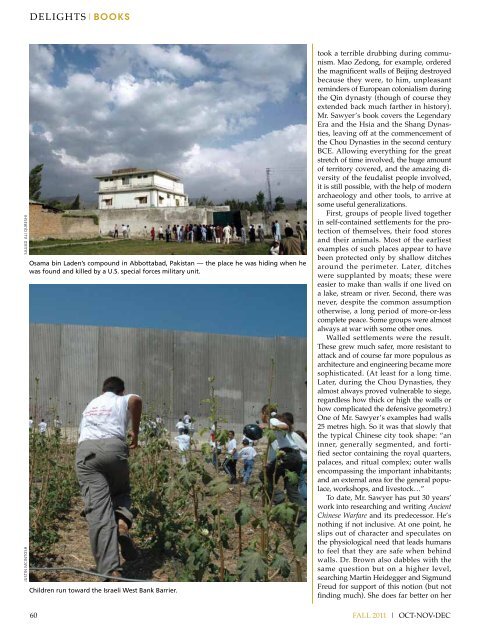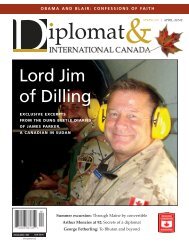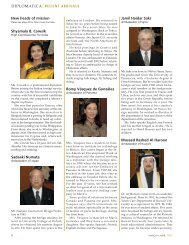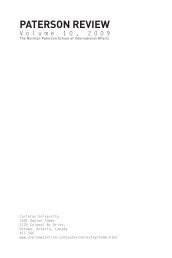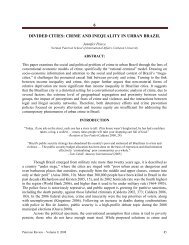the new petro power paradigm - Diplomat Magazine
the new petro power paradigm - Diplomat Magazine
the new petro power paradigm - Diplomat Magazine
You also want an ePaper? Increase the reach of your titles
YUMPU automatically turns print PDFs into web optimized ePapers that Google loves.
DELIGHTS|BOOKS<br />
Sajjad Ali Qureshi<br />
Justin McIntosh<br />
Osama bin Laden’s compound in Abbottabad, Pakistan — <strong>the</strong> place he was hiding when he<br />
was found and killed by a U.S. special forces military unit.<br />
Children run toward <strong>the</strong> Israeli West Bank Barrier.<br />
60<br />
took a terrible drubbing during communism.<br />
Mao Zedong, for example, ordered<br />
<strong>the</strong> magnificent walls of Beijing destroyed<br />
because <strong>the</strong>y were, to him, unpleasant<br />
reminders of European colonialism during<br />
<strong>the</strong> Qin dynasty (though of course <strong>the</strong>y<br />
extended back much far<strong>the</strong>r in history).<br />
Mr. Sawyer’s book covers <strong>the</strong> Legendary<br />
Era and <strong>the</strong> Hsia and <strong>the</strong> Shang Dynasties,<br />
leaving off at <strong>the</strong> commencement of<br />
<strong>the</strong> Chou Dynasties in <strong>the</strong> second century<br />
BCE. Allowing everything for <strong>the</strong> great<br />
stretch of time involved, <strong>the</strong> huge amount<br />
of territory covered, and <strong>the</strong> amazing diversity<br />
of <strong>the</strong> feudalist people involved,<br />
it is still possible, with <strong>the</strong> help of modern<br />
archaeology and o<strong>the</strong>r tools, to arrive at<br />
some useful generalizations.<br />
First, groups of people lived toge<strong>the</strong>r<br />
in self-contained settlements for <strong>the</strong> protection<br />
of <strong>the</strong>mselves, <strong>the</strong>ir food stores<br />
and <strong>the</strong>ir animals. Most of <strong>the</strong> earliest<br />
examples of such places appear to have<br />
been protected only by shallow ditches<br />
around <strong>the</strong> perimeter. Later, ditches<br />
were supplanted by moats; <strong>the</strong>se were<br />
easier to make than walls if one lived on<br />
a lake, stream or river. Second, <strong>the</strong>re was<br />
never, despite <strong>the</strong> common assumption<br />
o<strong>the</strong>rwise, a long period of more-or-less<br />
complete peace. Some groups were almost<br />
always at war with some o<strong>the</strong>r ones.<br />
Walled settlements were <strong>the</strong> result.<br />
These grew much safer, more resistant to<br />
attack and of course far more populous as<br />
architecture and engineering became more<br />
sophisticated. (At least for a long time.<br />
Later, during <strong>the</strong> Chou Dynasties, <strong>the</strong>y<br />
almost always proved vulnerable to siege,<br />
regardless how thick or high <strong>the</strong> walls or<br />
how complicated <strong>the</strong> defensive geometry.)<br />
One of Mr. Sawyer’s examples had walls<br />
25 metres high. So it was that slowly that<br />
<strong>the</strong> typical Chinese city took shape: “an<br />
inner, generally segmented, and fortified<br />
sector containing <strong>the</strong> royal quarters,<br />
palaces, and ritual complex; outer walls<br />
encompassing <strong>the</strong> important inhabitants;<br />
and an external area for <strong>the</strong> general populace,<br />
workshops, and livestock…”<br />
To date, Mr. Sawyer has put 30 years’<br />
work into researching and writing Ancient<br />
Chinese Warfare and its predecessor. He’s<br />
nothing if not inclusive. At one point, he<br />
slips out of character and speculates on<br />
<strong>the</strong> physiological need that leads humans<br />
to feel that <strong>the</strong>y are safe when behind<br />
walls. Dr. Brown also dabbles with <strong>the</strong><br />
same question but on a higher level,<br />
searching Martin Heidegger and Sigmund<br />
Freud for support of this notion (but not<br />
finding much). She does far better on her<br />
FALL 2011 | OCT-NOV-DEC


